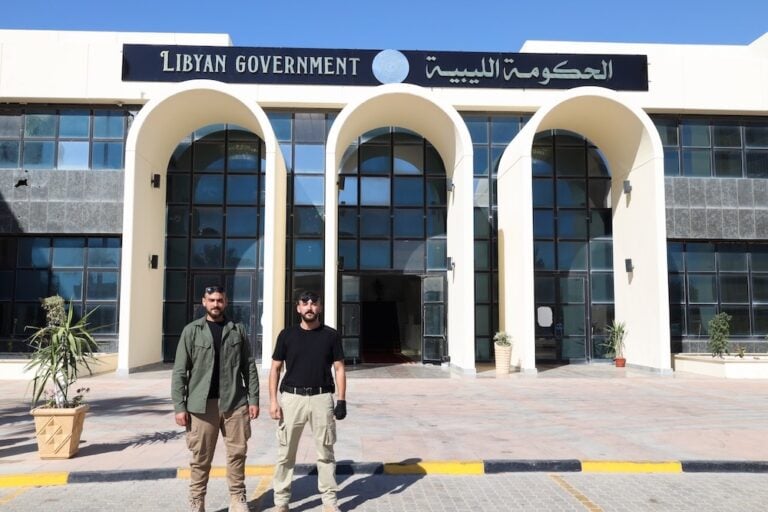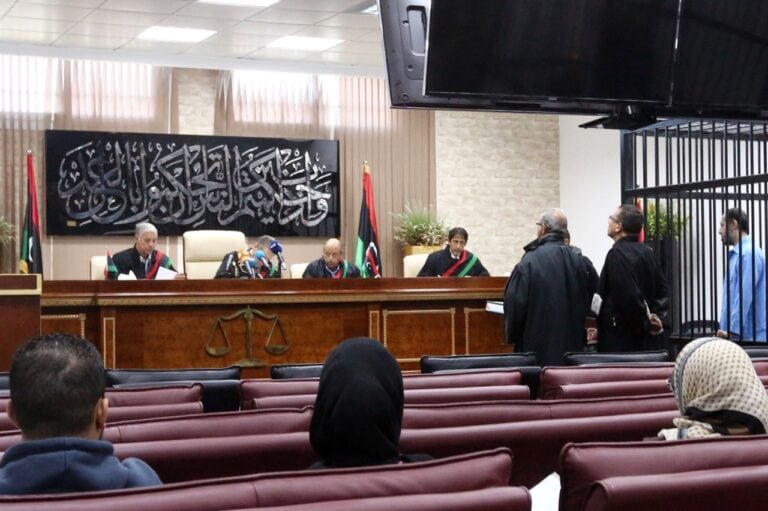The decree, which was passed on 22 January 2014, censors a wide range of speech, including peaceful political dissent, and its broad and vague wording is open to arbitrary implementation.
A new decree passed by Libya’s parliament banning satellite television stations critical of the government and the 2011 uprising against Gaddafi violates free speech and Libya’s Provisional Constitutional Declaration, Human Rights Watch said today. The decree was passed January 22, 2014. The government also slashed scholarship funding for students abroad, along with salaries and bonuses to employees who take part in activities “inimical” to the revolution.
“You’d think that Libyans learned long ago that suppressing speech, no matter how harsh, does nothing to foster security or peace,” said Sarah Leah Whitson, Middle East and North Africa director at Human Rights Watch. “The best way to confront opinions that the government doesn’t like is to challenge them with better ideas that will convince Libyans.”
Decree 5/2014, “Concerning the Cessation and Ban on the Broadcasting of Certain Satellite Channels,” passed by Libya’s parliament, the General National Congress (GNC), on January 22, instructs the ministries of Foreign Affairs, Communications, and [Mass] Media to “take necessary steps required” to halt the transmission of all satellite television stations that are “hostile to the February 17 revolution and whose purpose is the destabilization of the country or creating divisions among Libyans.” It further instructs the government to “take all measures” against states or businesses in territories from where the channels are broadcast if they do not block the transmission of these stations.
The decree violates freedom of expression because it censors a wide range of speech, including peaceful political dissent, and its broad and vague wording is open to arbitrary implementation, Human Rights Watch said. While the government could lawfully ban speech that is found to directly incite violence, it should not ban all of a satellite channel’s broadcasts even if some of the speech that it disseminates is found to incite violence. Human Rights Watch urged the government to revoke the resolution.
The ban appears intended to block satellite stations that have taken a pro-Gaddafi position in their editorial content; in particular, it appears aimed at a pro-Gaddafi station, al-Khadra Channel, and al-Jamahiriyah.
Libya’s government also passed Resolution 13/2014 on January 24, discontinuing scholarships to students studying abroad and salaries and bonuses to Libyan employees, for “taking part in activities inimical to the February 17 revolution,” which is widely understood to encompass statements and protests against the current government. It calls on Libyan embassies abroad and others to draw up lists of names and refer them to the Prosecutor General for prosecution.
“These efforts to sanction Libyans who don’t support the revolution or the current government should be an embarrassment for all those who pledged a new era of freedom for Libyans,” Whitson said. “Punishing students and employees who don’t toe the government’s political line is a tactic that should have ended with the fall of Gaddafi.”
The government’s effort to ban pro-Gaddafi media comes in the context of a difficult political and security environment. Seemingly pro-Gaddafi armed groups in southern and western Libya have engaged in pitched battles against pro-government forces, resulting in at least 154 deaths and 463 injured people according to an Agence France Presse report. In the past year, armed groups and unknown assailants assassinated at least 70 Libyans associated with the Gaddafi government, mainly former members of the Gaddafi security forces, but also political opponents of Gaddafi, and judges, with virtually no arrests by the government.
It is unclear how the Libyan government will enforce this ban against satellite stations operating outside of the country.
These decrees follow a number of prosecutions of high-profile activists, journalists and politicians who have expressed critical views. A court sentenced Jamal al-Hajji, an activist detained under Gaddafi, to eight months in prison with labor and a steep fine for making false accusations against government officials and others.
Since the removal of the Gaddafi government, prosecutors have relied on penal code provisions restricting speech to prosecute at least three other people for speech related “crimes,” including blasphemy and defamation charges.
On June 14, 2012, the Libyan Supreme Court declared unconstitutional a law that criminalized free speech, Law 37/2012, which the National Transitional Council had passed on May 2, 2012. The law criminalized a variety of types of political speech, including speech that “glorifies the tyrant [Muammar Gaddafi],” did “damage [to] the February 17 Revolution,” or insulted Libya’s institutions. The presiding Judge, Kamal Edhan, declared the law unconstitutional. The case was litigated by a group of lawyers who included the current justice minister, Salah al-Marghani, and the National Council for Civil Liberties and Human Rights.
“While the authorities would be right to prosecute those whose speech directly incites violence and killings of other Libyans, this law against satellite channels that oppose the revolution is far too broad goes well beyond any permitted restrictions on speech,” Whitson said. “Rather than trying to silence those who oppose the revolution, the government should be demonstrating through its achievements why the people of Libya should support it.”


